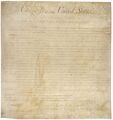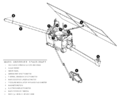Template:Selected anniversaries/September 25: Difference between revisions
No edit summary |
No edit summary |
||
| Line 6: | Line 6: | ||
File:Bill of Rights.jpg|link=United States Bill of Rights (nonfiction)|1789: The United States Congress passes twelve amendments to the United States Constitution: The Congressional Apportionment Amendment (which was never ratified), the Congressional Compensation Amendment, and the ten that are known as the [[United States Bill of Rights (nonfiction)|Bill of Rights]]. | File:Bill of Rights.jpg|link=United States Bill of Rights (nonfiction)|1789: The United States Congress passes twelve amendments to the United States Constitution: The Congressional Apportionment Amendment (which was never ratified), the Congressional Compensation Amendment, and the ten that are known as the [[United States Bill of Rights (nonfiction)|Bill of Rights]]. | ||
||George Salmon (25 September 1819 – 22 January 1904) was a distinguished and influential Irish mathematician and Anglican theologian. After working in algebraic geometry for two decades, Salmon devoted the last forty years of his life to theology. His entire career was spent at Trinity College Dublin. | |||
File:Judge Havelock With Glass.jpg|link=Judge Havelock With Glass|1845: ''[[Judge Havelock With Glass]]'' is "a reasonably accurate depiction of events as I experienced them," according to [[Judge Havelock|the Judge]]. | File:Judge Havelock With Glass.jpg|link=Judge Havelock With Glass|1845: ''[[Judge Havelock With Glass]]'' is "a reasonably accurate depiction of events as I experienced them," according to [[Judge Havelock|the Judge]]. | ||
Revision as of 18:53, 4 November 2017
1644: Astronomer and instrument maker Ole Rømer born. He will make the first quantitative measurements of the speed of light.
1789: The United States Congress passes twelve amendments to the United States Constitution: The Congressional Apportionment Amendment (which was never ratified), the Congressional Compensation Amendment, and the ten that are known as the Bill of Rights.
1845: Judge Havelock With Glass is "a reasonably accurate depiction of events as I experienced them," according to the Judge.
1893: Mathematician and statistician Harald Cramér born. He will help found probability theory as a branch of mathematics, writing in 1926: "The probability concept should be introduced by a purely mathematical definition, from which its fundamental properties and the classical theorems are deduced by purely mathematical operations."
1992: NASA launches the Mars Observer, a $511 million probe to Mars, in the first U.S. mission to the planet in 17 years. The probe will fail eleven months later.
2002: Steganographic analysis of Humpty Dumpty At Bat reveals previously unknown biography of Babe Ruth by Lewis Carroll.
2003: Journalist, writer, literary editor, and actor George Plimpton dies.
2017: Dennis Paulson of Mars says that the twenty-fifth anniversary of the launch of the Mars Observer is a bittersweet event, because the spacecraft will be lost eleven months later.







